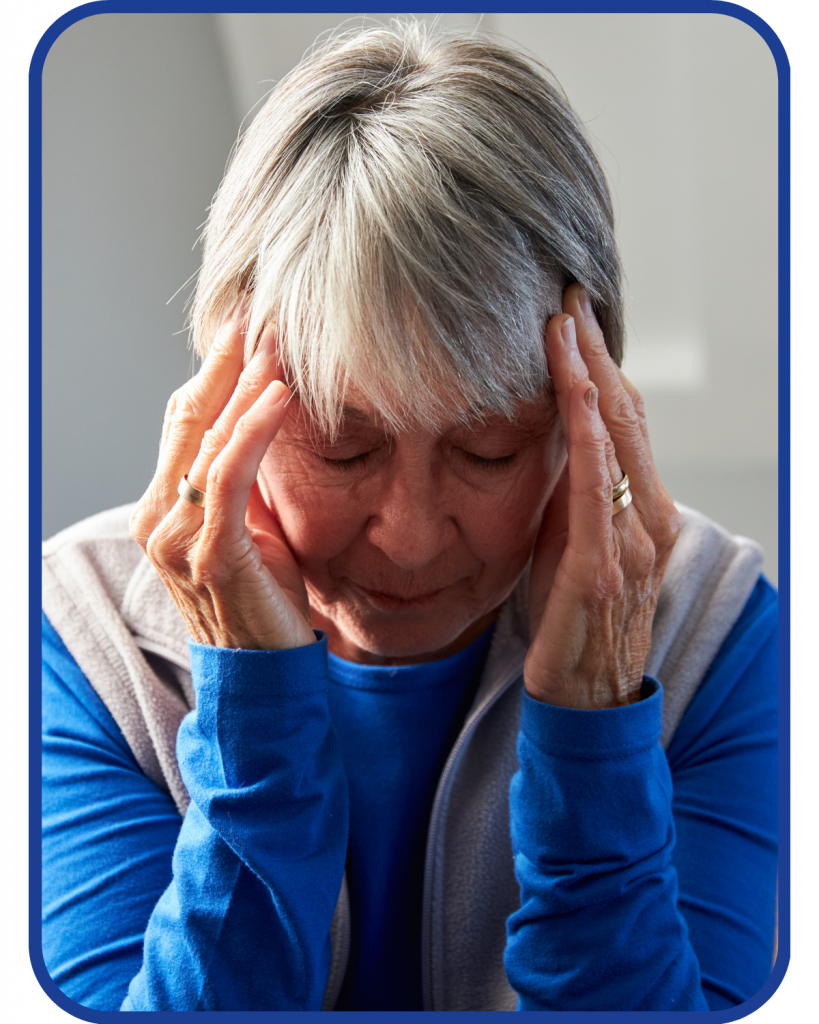Caregiver’s Compass: Navigating Senior Mental Health Challenges
Caring for the mental health of our senior loved ones is just as vital as attending to their physical well-being, yet it’s often overlooked. When mental health issues in seniors go unnoticed or unaddressed, it can lead to unnecessary suffering. Surprisingly, around 20 percent of individuals aged 55 and above experience some form of mental health challenge, including anxiety, depression, dementia, and even suicidal thoughts. Unfortunately, less than three percent of older adults seek mental health solutions. In this article, we’ll explore the common symptoms of mental illness in seniors, understand different mental health conditions, and provide tips for caregivers to support their loved ones.
 Recognizing Symptoms of Mental Illness in Seniors
Recognizing Symptoms of Mental Illness in Seniors
As our loved ones age, spotting signs of mental illness can be challenging due to the natural aging process, which can mask these symptoms. Seniors may express their mental health struggles behaviorally or physically rather than verbally. Here are eight signs to look out for in seniors during conversations that could indicate the presence of mental illness:
- Unusual Avoidances: While it’s normal for seniors to avoid extreme heat or exhausting activities, it’s unusual for them to avoid eye contact, using the bathroom, touching certain objects, or participating in events. Keep an eye out for these extreme or unusual avoidances.
- Difficulty Making Basic Decisions: Struggling to make basic decisions or frequently changing their minds may be a sign of mental illness. Memory, emotions, and judgment processes influence decision-making.
- Unexplained Stomach Distress: Seniors’ gut health can reveal much about their physiological state. Unexplained digestive problems may be linked to feelings or thoughts caused by mental illness.
- Agitation or Moodiness: While irritability in seniors may be due to physical conditions like chronic pain, agitation, and moodiness without a reasonable cause may indicate a mental health problem.
- Change in Appetite or Sleeping Patterns: A change in eating or sleeping habits is often the first sign of depression. Pay attention to a senior’s routine and ask questions to understand why their habits may be changing.
- Disinterest with Fatigue: While feeling tired is common due to aging, constant or chronic fatigue may indicate something more. Be on the lookout for a disinterest in hobbies or a decrease in socialization due to fatigue.
- Hallucinations or Delusions: If a senior recalls information that doesn’t make sense or never occurred, they may be experiencing hallucinations or delusions, manifesting as paranoia or confusion.
- Sudden Changes in Behavior and Attitude: It’s unusual for optimistic seniors to feel sad all the time with no apparent cause. Similarly, suppose a senior who regularly participates in a hobby suddenly stops without explanation. In that case, they may be struggling with a mental illness.
Source: Today's Geriatric Medicine
Understanding Common Mental Health Conditions
It’s essential for caregivers to be knowledgeable about common mental health conditions that affect seniors. Anxiety, in particular, takes various forms and can be linked to medications, depression, or other health issues. Here are some common mental health conditions to be aware of:
Anxiety: Anxiety comes in several forms and can be closely tied to medications, depression, or other health issues. These forms include Panic Disorder, Obsessive Compulsive Disorder (OCD), Post-Traumatic Stress Disorder (PTSD), and Phobias, among others. Generalized Anxiety Disorder (GAD) is characterized by ongoing worry about everyday life and activities. If you see any of these symptoms of anxiety in your loved one, seek reliable medical assistance. Their family doctor may be able to determine if the symptoms are linked to a medication or medical diagnosis. A trained mental health professional can determine the appropriate way to lead them through.
Source: Mental Health America
Depression: Depression is a condition that seniors may be less likely to seek help for, partly due to the stigma surrounding mental health in older generations. It can worsen health in individuals with heart disease, diabetes, and stroke as they become less inclined to care for themselves. Indications that a loved one might be depressed include:
- Persistent sadness.
- Recurring thoughts of self-harm or suicide.
- Changes in appetite.
- Withdrawal from previously enjoyed activities.
- Disrupted sleep patterns.
Source: Centers for Disease Control and National Institute of Mental Health
Dementia: Dementia is characterized by a deterioration in memory, thinking, behavior, and the ability to perform daily activities. While it primarily affects older individuals, dementia is not a normal part of aging. Early diagnosis is increasingly possible due to sensitive diagnostic tools. Alzheimer’s disease, the most common cause of dementia, affects millions worldwide. Understanding the challenges posed by dementia, including its potential to trigger anxiety, depression, or suicidal thoughts, is crucial for caregivers.
Source: World Health Organization and American Psychological Association

Suicidal Thoughts: Suicidal thoughts are alarmingly prevalent among older Americans, particularly among older men who have the highest suicide rate of any age group. Those suffering from depression are at the greatest risk for suicide. Caregivers should not ignore remarks about death or self-harm and should seek immediate help if a loved one seems depressed. If firearms are in the home, they should be removed promptly. For additional guidance, the National Suicide Prevention Lifeline at 800-273-8255 provides confidential assistance.
Source: AARP
In conclusion, prioritizing the mental health of senior loved ones is crucial. By recognizing the signs of mental illness, understanding common conditions, and seeking appropriate help, caregivers can make a significant positive impact on their loved ones’ well-being. Remember, mental health matters at every stage of life, and with the right support, seniors can enjoy a fulfilling and balanced quality of life.
Local Austin Resource for Mental Health Care:
Discover compassionate and personalized mental health care at Ellie Mental Health in Central Northwest Austin, Texas. They provide a judgment-free environment where authenticity is celebrated and offer customized counseling services to meet your unique therapy needs. Whether it’s individual therapy, couples therapy, online therapy, family therapy, grief therapy, or trauma-informed therapy, their team is here to help. They specialize in addressing various mental health concerns, including anxiety disorders, depression, PTSD, ADHD, and more. Visit their website at www.elliementalhealth.com or call 512-610-7719 to request an appointment and take a step toward better mental well-being with Ellie Mental Health.
 Caregiver Tip:
Caregiver Tip:
Caregivers of veterans should remain vigilant about the possibility of late-onset Post-Traumatic Stress Disorder (PTSD), which can manifest later in life or intensify after years of stability. Combat memories can linger and continue to cause distress, even decades later. Retirement, medical issues, or exposure to distressing news about current conflicts can exacerbate PTSD symptoms. Therefore, caregivers should support veterans in seeking appropriate support and treatment.
Source: va.gov


